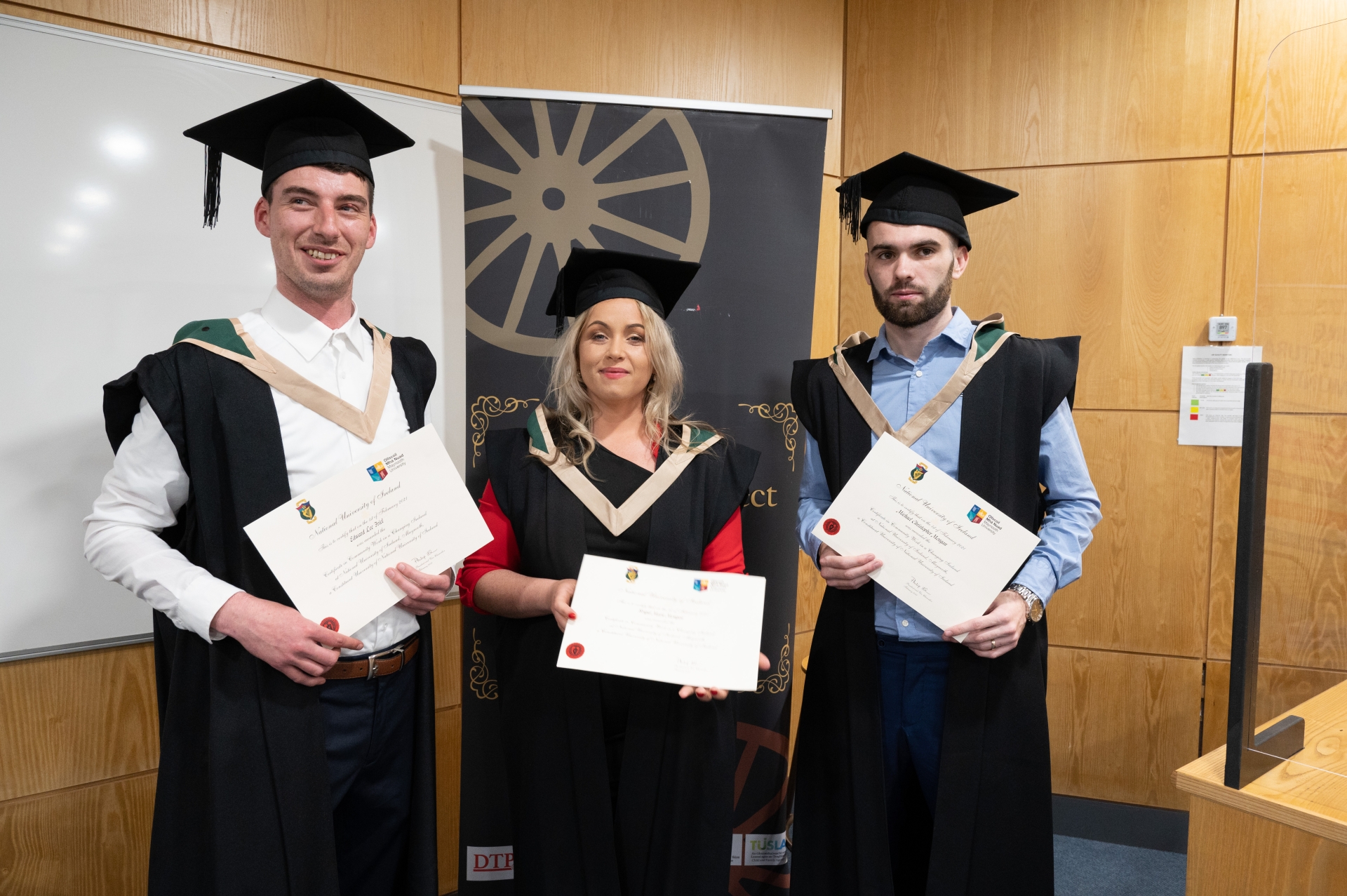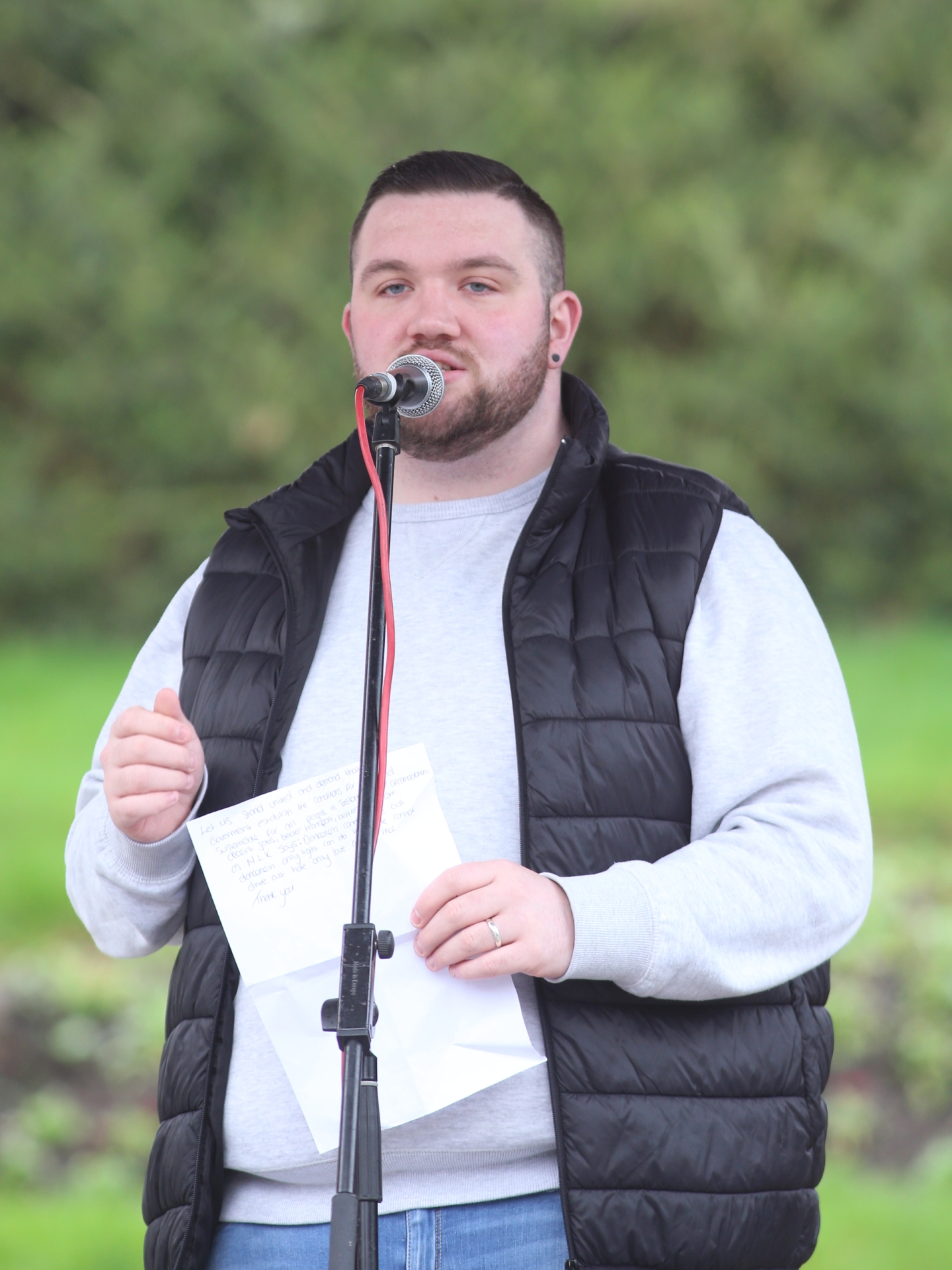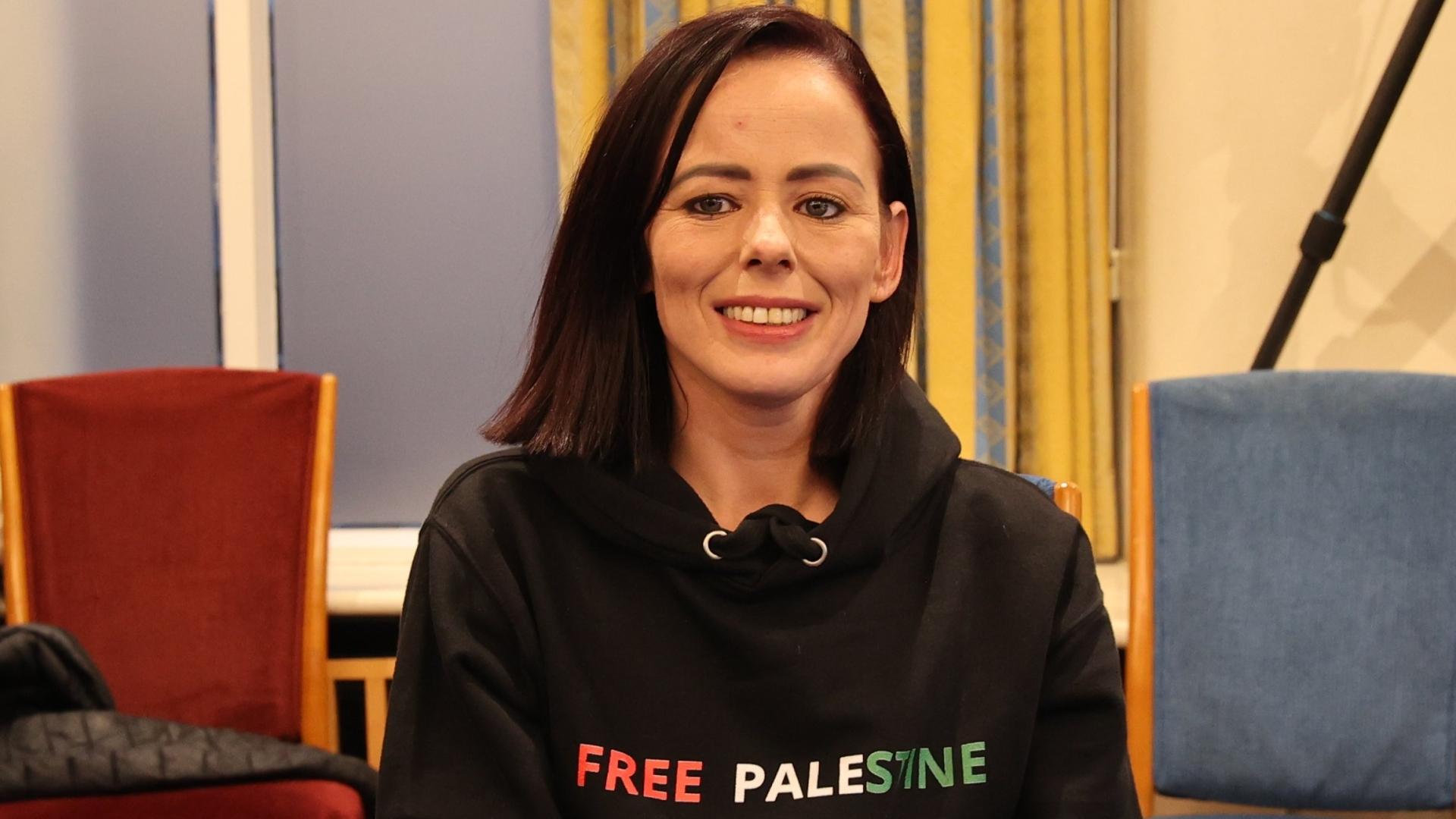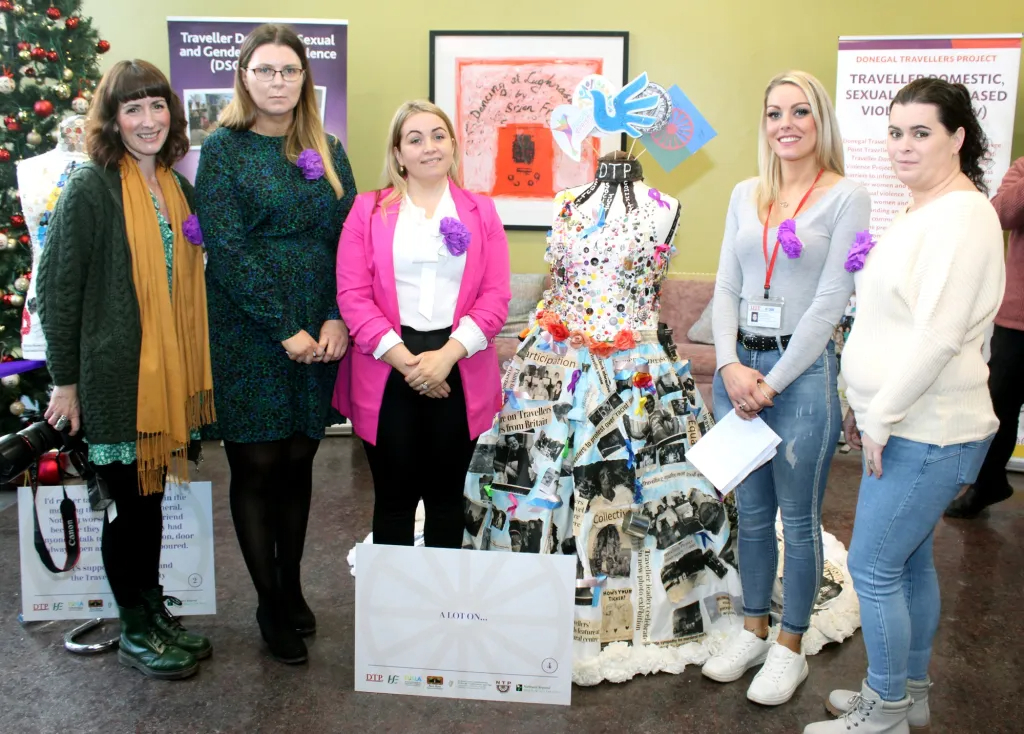
Various representatives at the Traveller Health Action Plan last month
Today, Saturday, is Traveller Ethnicity Day and four members of Donegal Travellers Project have shared their views on where the community stands.
Brigid-Marie Mongan, Lead Community Health Worker; David Friel, Lecturer; Senator Eileen Flynn and Michelle Mongan, a Community Health Worker, discuss matters to date and the steps that need to be taken next.
Brigid-Marie Mongan, Lead Community Health Worker
Q - Do you feel the recognition has made a difference to the Traveller community, to Traveller families and yourself?
A - No, Travellers are still being discriminated against in Donegal, trying to book venues and accessing pubs and shops. I myself can’t book a venue in my own name I may use my first name but not my surname or my double barrel name and I won’t book over the phone due to my accent so I make bookings through emails this can secure a venue, until I land with my family and then it’s our appearance that’s took into account and god forbid if the staff know who you are.
I have taken cases against discrimination, but who really won? I’m still not accessing my loyal shops without being watched and followed, and still not using my full name and surname to book venues. The recognition has given the travelling community a feeling of being accepted and a right to take on discriminatory cases but hasn’t changed any bias or negative attitudes from the general population.
Q - If you have the influence to bring about major changes for the Traveller community as an ethnic minority, what needs to happen?
A - Equity for the Traveller community, we should not be discriminated against or treated by bias attitudes from services, shops and pubs. We should be treated like the settled community when a Traveller does something wrong, then penalise them, not me or my family because we are also Travellers. We should be allowed to hold special celebrations with our extended families without using a false name and being watched throughout the day while attending a venue.
David Friel, Lecturer
Q - Why was it important for Irish Travellers to be recognised as an ethnic minority by the Irish state in your opinion?
A - Traveller ethnicity, for me, brings to mind bell hooks' work on the margins, where identity, oppression, and resistance intersect.
Recognition wasn’t about asking for permission to exist; it was about affirming what had always been true. It acknowledged the values and traditions that set us apart from the majority population and it forced the state to admit what it had denied for decades, that Travellers experience racism.
For too long, the Irish state dismissed the reality of anti-Traveller racism, framing our exclusion as an issue of poverty or disadvantage rather than structural discrimination. Recognition was a vital step in dismantling that narrative. It marked a shift in how Travellers are understood within Irish society, not just as a community in need but as a distinct ethnic group with rights that should be respected, protected and fulfilled.
But recognition alone changes little if it is not followed by meaningful action. It is one thing to acknowledge ethnicity, but another entirely to ensure that public services, policies, and laws reflect that reality in practice. Ethnicity recognition must be the foundation for tackling the systemic inequalities Travellers face, not just a symbolic milestone to be referenced when convenient.
Q - Do you feel the recognition has made a difference to the Traveller community, to Traveller families, and to yourself?
A - Symbolically, recognition was important, but in practical terms, it has yet to translate into meaningful protections. Travellers continue to fare poorly on all the social determinants of health, with lower life expectancy, higher rates of chronic illness, mental health disparities, and barriers to education and employment. While recognition provided a foundation, it must be legislated to ensure that it leads to tangible change in how the state supports and protects Traveller communities. Without legislative backing, ethnicity recognition risks being a symbolic gesture rather than a mechanism for addressing the deep-rooted inequalities Travellers experience.
Q - Do you think the recognition of ethnicity is understood and considered by public services and others in the county?
A - The weak commitment from public services in Donegal is emblematic of how Traveller needs, aspirations, and rights are understood and responded to. It is not about treating Traveller issues as an add-on but about embedding meaningful engagement into core policy and planning processes. I have completed significant work on Public Sector Duty in the county, and while this duty legally obliges public bodies to proactively promote human rights and inclusion, implementation remains weak. Services must plan for Traveller needs as an integral part of their work rather than seeing engagement with Travellers as an occasional or tokenistic exercise. For too long, the approach has been reactive rather than proactive.
Q - How has the recognition of ethnicity, if any, improved the quality of life for the Traveller community?
A - This is a question that entails many caveats and complexities. While policy, as it has historically, continues to respond to the needs of Travellers, it can only be defined as a policy implementation deficit—considering we have had five failed Traveller accommodation policies in the last 20 years. The reality is that the recognition of ethnicity has not resulted in better living conditions, improved health outcomes, or greater access to services. However, it has led to increased awareness, strengthened advocacy, and a sense of cultural affirmation within the community. Young Travellers now have a clearer sense of their identity being acknowledged in public discourse. But for recognition to truly improve quality of life, it must be linked to enforceable rights and accountability at all levels of governance.
Q - What do you think needs to happen in the next five years to ensure that the Irish state enshrines the distinct cultural rights of the Traveller community in public policy and services?
A - The next five years must focus on shifting from recognition to implementation. This includes:
Ethnicity recognition must be legally enshrined in policies across all sectors to ensure it carries weight beyond symbolism.
Public bodies must be held accountable for delivering on Traveller-specific commitments and be required to demonstrate progress.
Public services need to create brave spaces where they acknowledge and take responsibility for the inequalities that are occurring rather than avoiding difficult conversations.
There needs to be a shift in the Irish psyche regarding how we respond to and interact with difference. An intercultural approach must be embedded across public services to ensure genuine inclusion rather than superficial diversity initiatives.
Travellers must be at the forefront of shaping the policies that affect them, with proper resourcing and decision-making power.
Q - Has the recognition of ethnicity contributed in any way to the eradication of racism and discrimination as experienced by the Traveller community?
A - Recognition alone has not eradicated racism. Travellers continue to experience discrimination in education, employment, access to public services, and day-to-day life. While recognition has strengthened legal arguments against discrimination, there has been little shift in how Travellers are treated in society. Anti-Traveller racism remains embedded, and many Travellers continue to experience exclusion at systemic and interpersonal levels. The challenge now is to ensure that this recognition is used as a foundation for dismantling the structures that perpetuate inequality.
Q - If you had the influence to bring about major changes for the Traveller community as an ethnic minority, what needs to happen?
A - The change needed is not just legislative or policy-driven;it is a change in the Irish psyche, in how we respond to and interact with difference. We need to move beyond viewing Travellers through a deficit lens and instead embrace an intercultural approach that values and respects our distinct identity.
Key priorities include:
Traveller ethnicity must be more than symbolic; it must be legally protected and enforced across all public institutions.
There must be accountability for local authorities that consistently fail to meet their obligations in providing culturally appropriate accommodation.
Schools and workplaces must actively dismantle barriers to inclusion through targeted supports and anti-discrimination measures.
Public services must shift from a 'one-size-fits-all' approach to one that acknowledges and integrates cultural diversity meaningfully.
Travellers must be visible at all levels of decision-making, from local councils to national policymaking spaces.
Ethnic recognition was the first step, but the real work lies in ensuring that this recognition leads to meaningful, lasting change. The coming years must be about action, not just acknowledgment.
Eileen Flynn, Senator
Q - Why was it important for Irish Travellers to be recognised as an ethnic minority by the Irish state in your opinion?
A - For generations, Travellers were denied our identity. The state’s formal recognition in 2017 wasn’t just about words on paper, it was an affirmation of our existence as a distinct people with our own history, language, and traditions. Absence of this recognition allowed stereotypes to thrive. We were often treated as a “problem” rather than a community with rich cultural contributions. Ethnic recognition matters because it challenges the idea that Travellers must assimilate to be valued. It’s about dignity, the right to say, “We belong here, and our way of life is valid”.
Q - Do you feel the recognition has made a difference to the Traveller community, to Traveller families and to yourself?
A - Symbolically, yes. When the Taoiseach stood in the Dáil and acknowledged our ethnicity, it sent a message to Traveller children that their identity is worth celebrating. But practical change has been slower. Traveller families still face homelessness, poor accommodation and barriers to healthcare. My own work in the Seanad has shown me that policy shifts like increased funding for mental health supports, are possible, but systemic inequalities persist. Recognition opened doors, but we’re still knocking down walls.
Q - Do you think the recognition of ethnicity is understood and considered by public services and others in the county?
A - There’s progress, but inconsistency. In Donegal, initiatives have trained schools and health workers on cultural competence, which helps. Yet, many Travellers still encounter discrimination in hospitals or Garda stations. Recent reports highlight that Travellers feel targeted by the justice system. Until every county council, school and hospital embeds anti-racism training, and listens to Travellers when designing services, we’ll keep fighting the same battles.
Q - How has the recognition of ethnicity, if any, improved the quality of life for the Traveller community?
A - In pockets. The establishment of a Traveller-specific mental health worker in Donegal has saved lives. Hate crime legislation, which I’ve championed, is closer to reality. But look at accommodation: most Travellers still live in overcrowded or unsafe conditions. Ethnic recognition alone doesn’t build houses or fund education. What it does is give us a stronger platform to demand those resources, and we must keep pushing for equality of opportunity.
Q - What do you think needs to happen in the next five years to ensure that the Irish state enshrines the distinct cultural rights of the Traveller community in the Irish state and in public policy and services?
A - Three words: action, accountability, allies.
Legislate hate crime laws and enforce inclusion strategies. Require public bodies to report annually on Traveller inclusion metrics, from school retention rates to healthcare access. Grow solidarity between Travellers and settled people. Projects like community documentaries show how storytelling bridges divides. We also need more Travellers in leadership roles, not just in politics, but in media, education and healthcare.
Q - Has the recognition of ethnicity contributed in any way to the eradication of racism and discrimination as experienced by the Traveller community?
A - It’s complicated. Many Travellers still face daily prejudice. Ethnicity isn’t a shield; it’s a rallying cry. When schools teach Traveller history or Gardaí prosecute hate speech, that’s when we’ll see change. I’ve faced slurs since being in the Seanad, but I’ve also seen many people standing with me. That gives me hope.
Q - If you had the influence to bring about major changes for the Traveller community as an ethnic minority, what needs to happen?
A - First, hate crime legislation. Words hurt, but laws change behaviour. Second, Traveller-led services. Who understands our needs better than us? The success of Donegal’s mental health initiatives proves this. Third, education reform. Mandate Traveller history in the curriculum, not as a footnote, but as a vibrant thread in Ireland’s story. Lastly, representation. My election wasn’t an endpoint; it was a spark. We need more Travellers in local councils, boards and media to reshape narratives.
Michelle Mongan, Community Health Worker
Q - Why was it important for Irish Travellers to be recognised as an ethnic minority by the Irish State in your opinion?
A - In my opinion, so that we would be seen as equal and be given the right opportunities as all ethnic minority groups and be seen as equal by services and government.
Q - How has the recognition of ethnicity improved the quality of life for the Traveller community?
A - It has given us the chance to be included in government forums. We are included more in services but we still face challenges. Hopefully over time there will be less challenges to worry about or face. The recognition of ethnicity has allowed us to use our voice more with services and lobby more for our rights as a community.
Subscribe or register today to discover more from DonegalLive.ie
Buy the e-paper of the Donegal Democrat, Donegal People's Press, Donegal Post and Inish Times here for instant access to Donegal's premier news titles.
Keep up with the latest news from Donegal with our daily newsletter featuring the most important stories of the day delivered to your inbox every evening at 5pm.